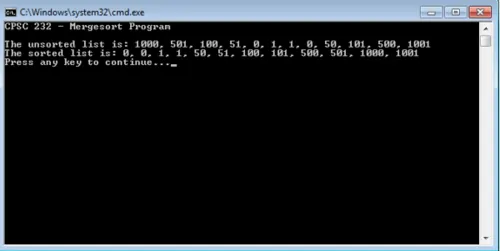Instructions
Objective
Write a program to sort a list using recursive merge sort in x86 Assembly language.
Requirements and Specifications
Description:
Write an x86 assembler assignment that to perform a recursive Mergesort sorting algorithm on a list of unsigned integers (up to 32-bits). The algorithm must correctly sort all the items in the input list in ascending order.
The declaration for the unsorted list must appear like the below picture in your code. Do not prompt the user to manually input the list.
Keep the following things in mind:
- Be sure to reuse your for merging sorted lists from code from PA #5. If your PA#5 implementation did not work, then fix it before attempting this problem.
- You must implement a recursive Merge Sort algorithm. The pseudocode for this, as well as other information on Mergesort, can be found in the attached PPT file. You can also Google other material and tutorials on Mergesort.
- Do not artificially limit the size of the input list. Thus, you are advised to use operators to determine the size of the list.
- Be aware that I will inspect your code as well as run it. If you implement an algorithm other than Mergesort (like Bubblesort), you will receive a zero. Your Mergesort implementation needs to be recursive.
Screenshots of output

.webp)
.webp)
.webp)
.webp)
Source Code
TITLE Program 7
; This program takes an unsorted array and sorts
; it using mergesort.
INCLUDE Irvine32.inc
.data
ProgInfo BYTE "CPSC 232 - Mergesort Program", 0
unSortList DWORD 1000, 501, 100, 51, 0, 1, 1, 0, 50, 101, 500, 1001
;unSortList DWORD 0,1,0,1,0,0,0,1,1,1,0,1,0
;unSortList DWORD 27,10,12,20,25,13,44,15,22,10,44,50,10
;unSortList DWORD 27,1000,12,20,25,13,44,15,22,10,44,50,10
;unSortList DWORD 100,99,98,97,96,95,94,93,92,91,90,50,51,52,53,54,55,56,57,59,59,10,9,8,7,6,5,4,3,2,1,0
tempList DWORD (LENGTHOF unsortList) DUP(0)
List1 BYTE "The unsorted list is: ", 0
List2 BYTE 10,"The sorted list is: ", 0
comma BYTE ", "
.code
Display PROC
mov eax,[esi]
add esi, 4
call writedec
dec ecx
DisplayLoop:
lea edx, comma
call writestring
mov eax,[esi]
add esi, 4
call writedec
loop DisplayLoop
ret
Display ENDP
Merge proc
L1:
cmp ebx, 0
je AddArray2
cmp ecx, 0
je AddArray1
mov eax,[esi]
cmp eax,[edi]
jl AddArray1 ;Jump if less
jmp AddArray2 ;Jump if greater or equal
AddArray1:
cmp ebx, 0
je EndJump
mov eax,[esi]
mov [edx],ax
add esi,4
add edx,4
dec ebx
jmp L1
AddArray2:
cmp ecx, 0
je EndJump
mov eax,[edi]
mov [edx],ax
add edi,4
add edx,4
dec ecx
jmp L1
EndJump:
ret
Merge ENDP
; Sorts using mergesort,
; requires esi = array to sort, edi = temporary array, ecx = array length
MergeSort PROC
push ecx ; save length
push esi ; save array
push edi ; save temp array
cmp ecx, 1 ; if length is 1, it's sorted
jle endSort
push ecx
shr ecx,1 ; divide length by 2
call MergeSort ; sort the half array
mov eax, ecx
pop ecx
push esi
push eax
sub ecx, eax ; get length of second half of array
shl eax, 2 ; multiply first array length by 4
add esi, eax ; advance pointer
call MergeSort ; sort the half array
mov edx, edi
mov edi, esi
pop ebx ; load length of first array
pop esi ; load address of first array
call Merge
mov esi,[esp] ; load address of temp array
mov edi,[esp + 4] ; load address of initial array
mov ecx, [esp+8] ; load number of elements
; copy from temp to initial array
copy:
mov eax,[esi]
mov [edi], eax
add esi, 4
add edi, 4
loop copy
endSort:
pop edi ; restore registers
pop esi
pop ecx
ret
MergeSort ENDP
main PROC
mov edx, OFFSET Proginfo
call WriteString
call Crlf
call Crlf
mov edx, offset List1
call writestring
mov ecx,lengthof unsortList
mov esi,offset unsortList
call Display
mov esi,OFFSET unsortList
mov edi,OFFSET tempList
mov ecx,LENGTHOF unsortList ; elements in list
call MergeSort
mov edx, offset List2
call writestring
mov ecx,lengthof unsortList
mov esi,offset unsortList
call Display
call Crlf
exit
main ENDP
END main Similar Samples
Explore our comprehensive collection of sample programming assignments, meticulously crafted to showcase our expertise and proficiency in various programming languages and concepts. These samples serve as a testament to our dedication to delivering high-quality solutions tailored to meet your academic needs. Witness firsthand the caliber of our work and envision the excellence we can bring to your projects.
Assembly Language
Assembly Language
Assembly Language
Assembly Language
Assembly Language
Assembly Language
Assembly Language
Assembly Language
Assembly Language
Assembly Language
Assembly Language
Assembly Language
Assembly Language
Assembly Language
Assembly Language
Assembly Language
Assembly Language
Assembly Language
Assembly Language
Assembly Language
